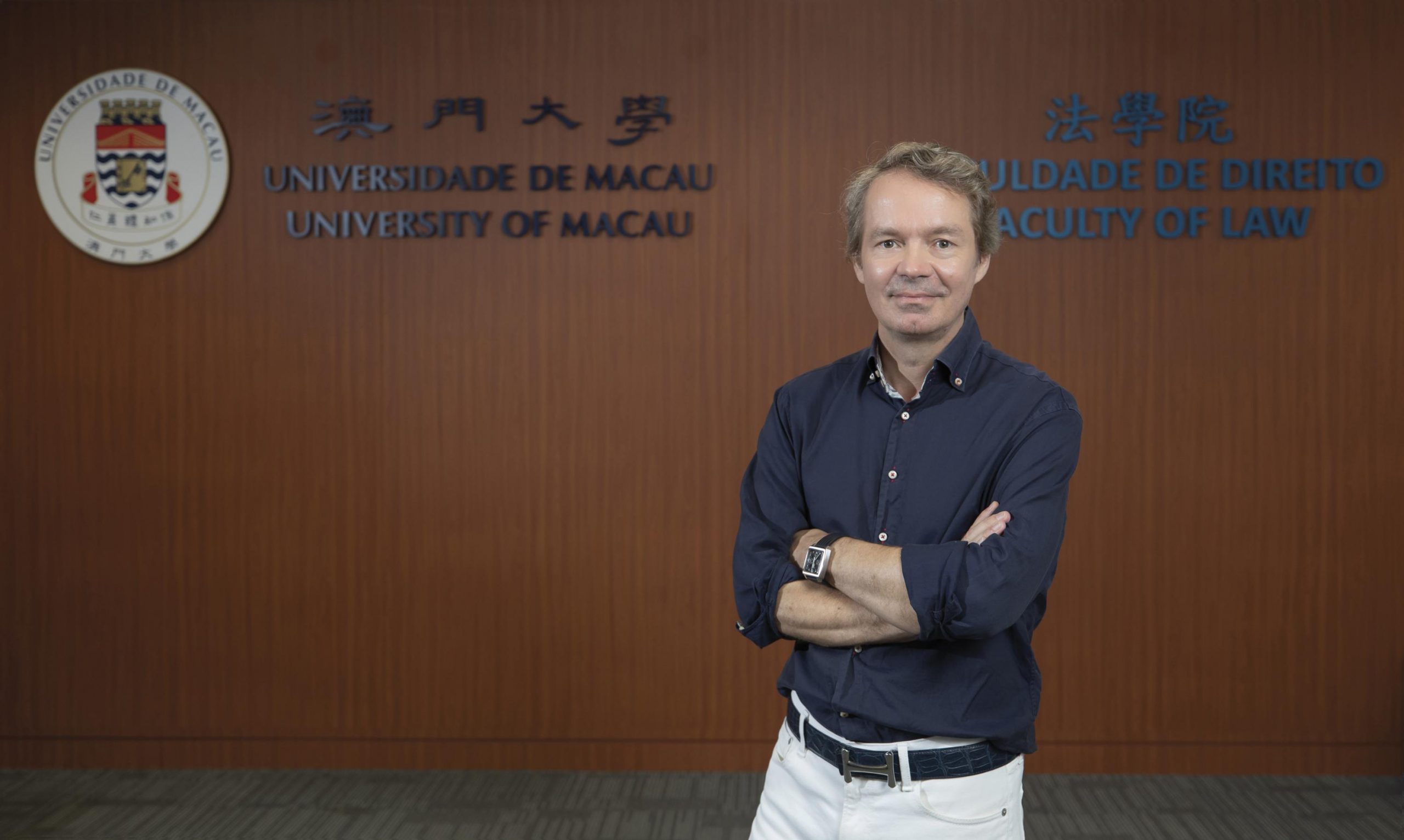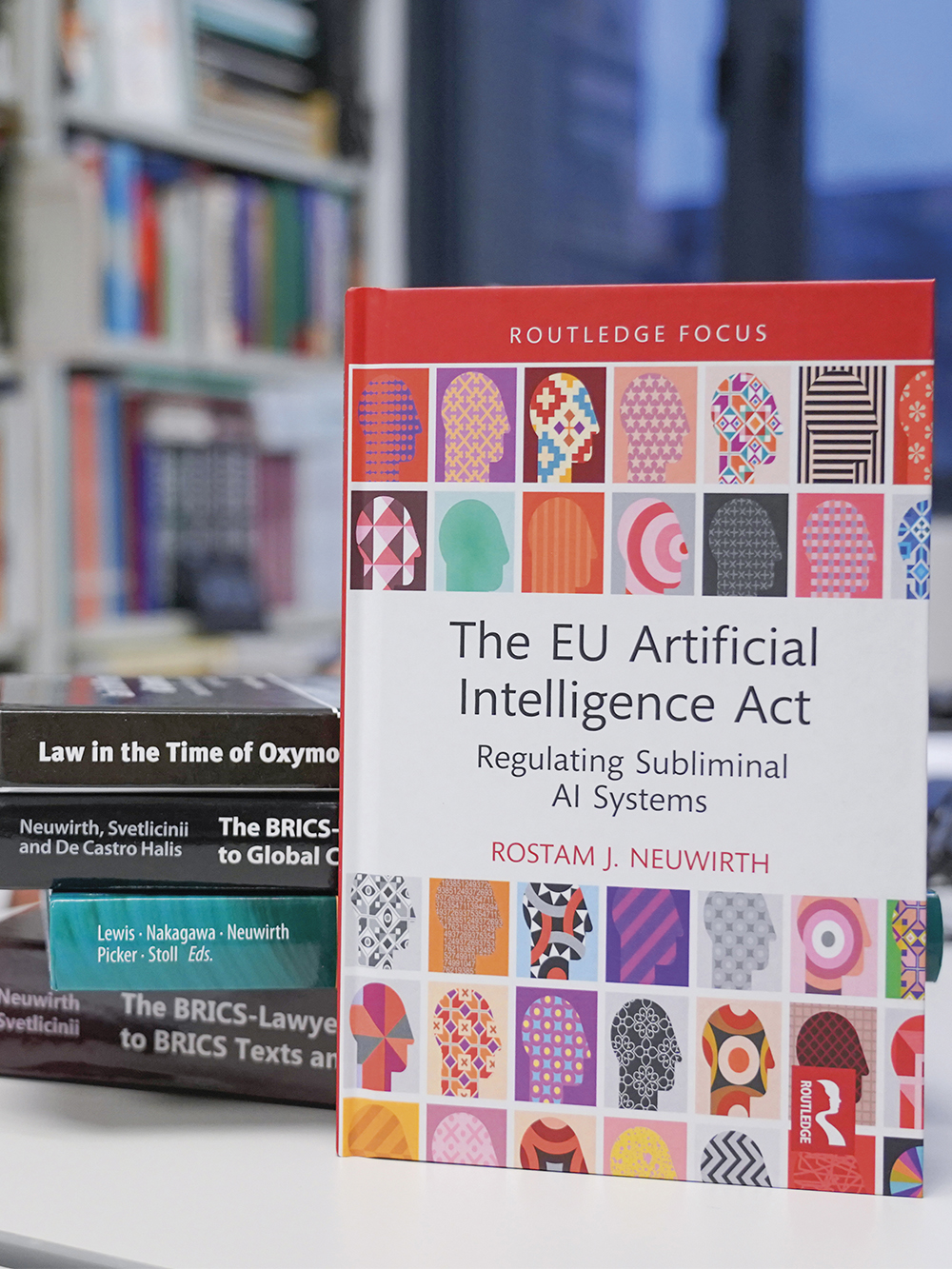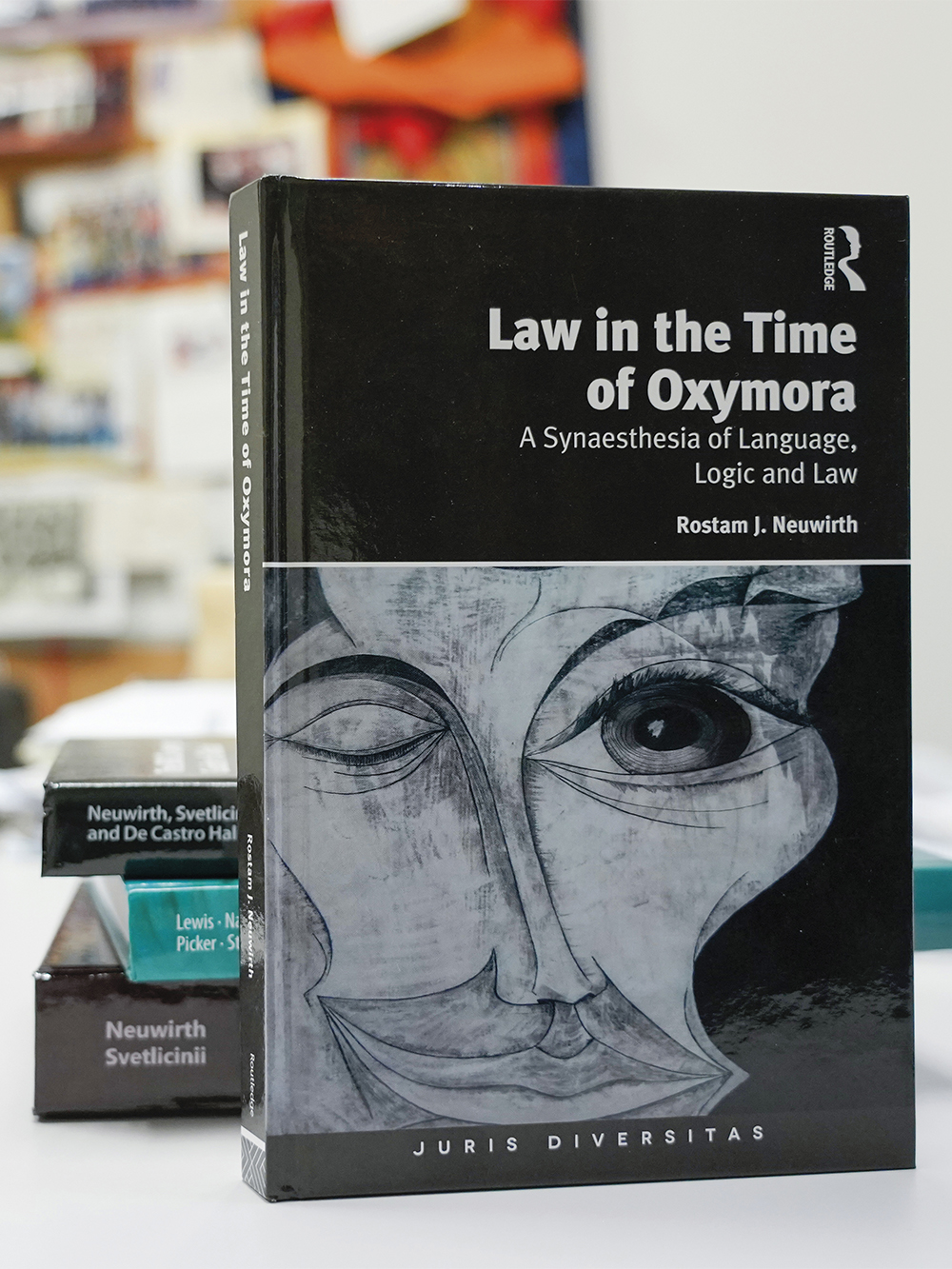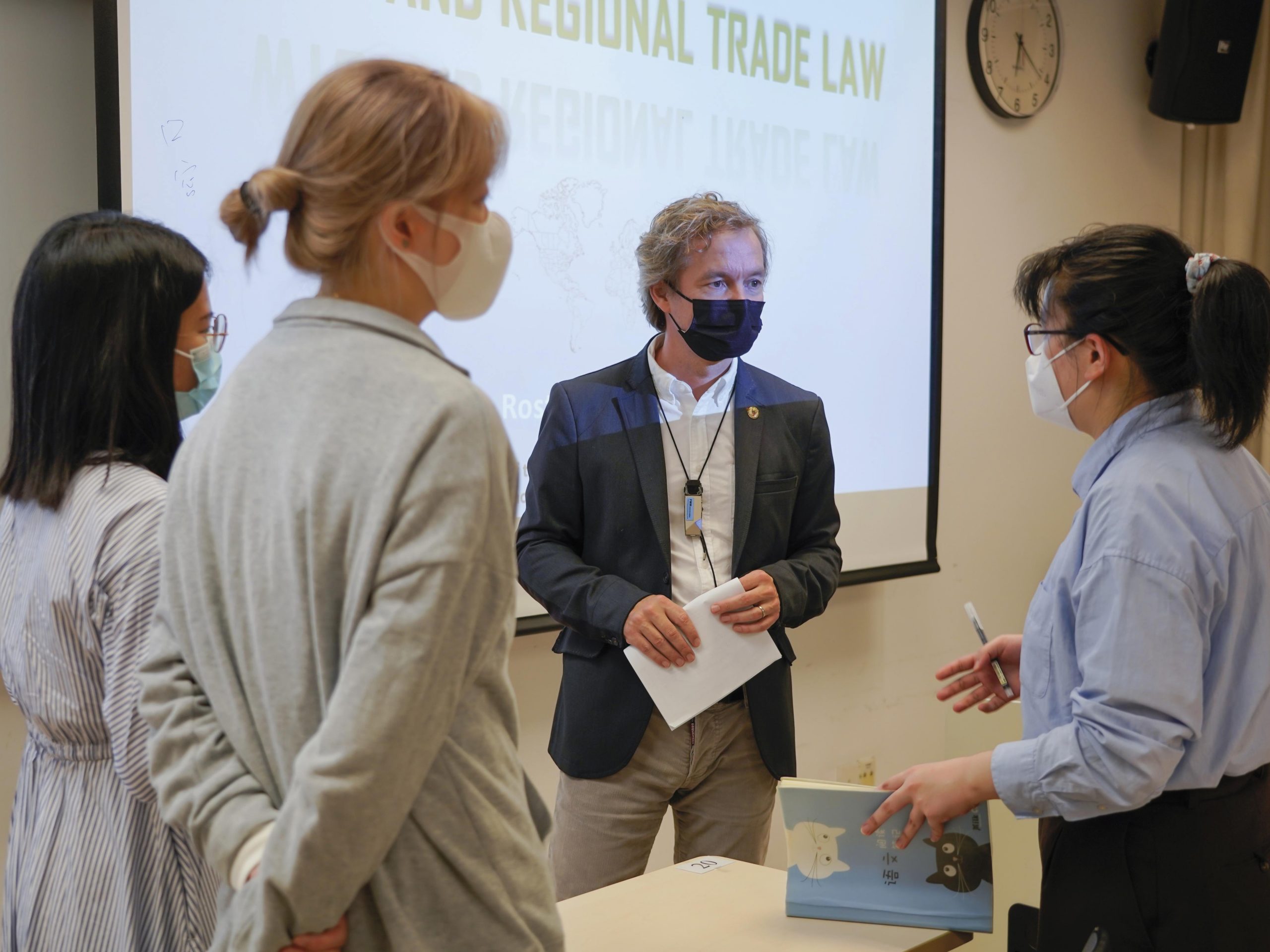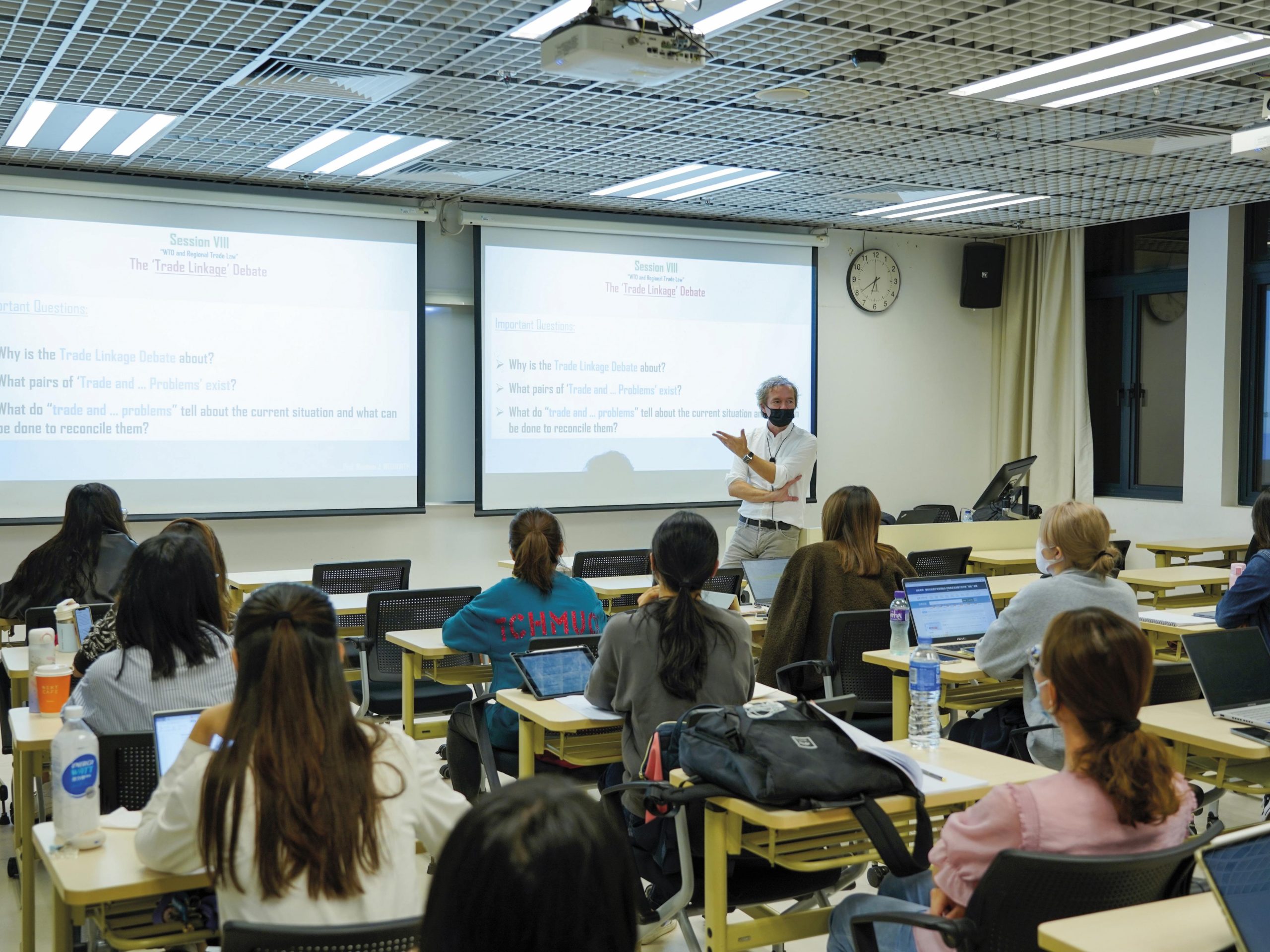Rostam J. Neuwirth, head of the Department of Global Legal Studies at the University of Macau (UM), is a legal scholar who engages in research on a variety of contemporary global governance issues focusing on the various links between law, language, and technology. In his most recent book, he sheds light on the challenges posed by the era of artificial intelligence (AI) in an effort to stimulate a transdisciplinary and transnational debate among readers.
Filling the Gap of AI Regulation
If AI is one day able to perceive the world the way humans do on an emotional, intellectual, and spiritual level, and develops the capacity to influence our behaviour through interactions, how should the AI technology be regulated? Prof Neuwirth has studied this issue in recent years.
AI technology has developed rapidly in recent years. Transcending the boundaries of time and space, the technology can be used for both good and evil purposes and therefore poses an unprecedented challenge to regulators. According to Prof Neuwirth, while we will soon enter a future in which AI is everywhere and easy enough to use, the current laws governing AI were drafted to address more specific issues such as databases, personal data protection, autonomous driving, and algorithmic trading and are not adequate to cover the overall impact of AI on society as a whole. Therefore, in order to regulate AI, future legislation must keep up with the times and adapt to the changes.
In May 2021, the European Commission proposed the AI Act, which introduced the world’s first legal framework for AI to regulate the use of smart technologies by businesses and governments. Prof Neuwirth spared no time in studying the 108-page-long regulation, knowing it would have a significant influence on the AI industry and related market development. ‘The formulation of the AI Act is a very complicated process as it involves many deep issues beyond the law, such as human cognition and ethical issues in science,’ says Prof Neuwirth.
In May 2021, the European Commission proposed the AI Act, which introduced the world’s first legal framework for AI to regulate the use of smart technologies by businesses and governments. Prof Neuwirth spared no time in studying the 108-page-long regulation, knowing it would have a significant influence on the AI industry and related market development. ‘The formulation of the AI Act is a very complicated process as it involves many deep issues beyond the law, such as human cognition and ethical issues in science,’ says Prof Neuwirth.
With over 30 years of experience in contemporary global legal research, Prof Neuwirth was determined to analyse the potential risks of AI applications from a legal perspective before the law was passed. Hoping to influence international academia, he compiled his findings in the monograph The EU Artificial Intelligence Act: Regulating Subliminal AI Systems in just one year. Published by Routledge, an internationally renowned British company, the book aims to stimulate a transdisciplinary and transnational debate between students, academics, practitioners, policymakers, and citizens.
How to Regulate AI
In his book, Prof Neuwirth focuses on how to regulate and prohibit the use of AI systems that deploy subliminal techniques. This is also one of the key topics proposed in the AI Act of the European Commission. According to Prof Neuwirth, the convergence of AI with various related technologies, such as brain–computer interfaces, functional magnetic resonance imaging, robotics, and big data, allows for ‘mind reading’ or ‘dream hacking’ through brain spyware, while external stimuli received below the threshold of awareness can secretly manipulate the human mind and alter human behaviour. ‘AI will be used in many different scenarios in the future. We must guard against the possibility of the manipulation of thought and behaviour through legal means,’ says Prof Neuwirth.
The formulation of a legal framework for AI also involves disciplines such as computer science, neuroscience, sociology, political science, marketing, and psychology. In the process of writing his book, Prof Neuwirth took advantage of the interdisciplinary platform provided by UM’s Institute of Advanced Studies in Humanities and Social Sciences to exchange ideas with experts from different disciplines at the university. ‘I was lucky to be able to learn about the different perspectives of my colleagues towards AI through the institute. One person cannot really cover all the challenges facing the regulation of AI development and application. We are all in the same boat,’ says Prof Neuwirth.
Challenging Dualism in Law
AI is an oxymoron or a ‘contradiction in terms’ as described by Prof Neuwirth in his 2018 book Law in the Time of Oxymora: A Synaesthesia in Language, Logic and Law (published by Routledge), since there remain serious doubts whether machines can be considered ‘intelligent’. Other examples of oxymora include ‘Death brings life’ from The Art of War and ‘honourable villain’ from Shakespeare’s Romeo and Juliet. Prof Neuwirth points out that oxymora are an integral part of everyday discourse, but people are rarely aware of the subtle influence that these widely used forms of rhetoric may have on their thinking.
From Prof Neuwirth’s observation, there have been a growing number of concepts consisting of such opposite propositions, such as the way that ‘sustainable development’ denotes change and not-change at the same time. In the legal field, the boundaries between opposing terms or concepts are difficult to clarify through legal reasoning in cases involving oxymora (e.g. the use of the term ‘real fakes’ to describe counterfeit products produced during night shifts in the original factories). Therefore, there is a need to find a more appropriate language for communication, which will help to create common understanding between lawyers and members of other professions as well as citizens in general. ‘From the perspective of cognitive linguistics, if two opposite propositions can be combined into a concept that is matched in reality, the law must adapt to the situation,’ says Prof Neuwirth. This view challenges the legal tradition of dualism, or the way people perceive the difference between justice and injustice, lawful and unlawful, and right and wrong.
In addition to insight into law and linguistics, Prof Neuwirth has a wealth of knowledge about legal topics such as the World Trade Organization (WTO) and regional trade law, transnational law, business law in the BRICS countries, intellectual property law and the creative economy, global justice and the creative economy, and European Union trade law. He has published three monographs, three co-edited books, 37 book chapters, as well as 44 academic articles in internationally influential journals such as the Journal of International Economic Law, the International Journal for the Semiotics of Law, the European Journal of Development Research, and the International Journal of Cultural Policy.
Studying Law from a Global Perspective
Prof Neuwirth became interested in oxymora 20 years ago when he was still a PhD student at the European University Institute in Italy. At that time, he explored the regulatory challenges facing international trade law in the context of the cultural industries. Growing up in Austria, Prof Neuwirth was nurtured by the region’s rich creative culture. In his opinion, while culture is a spiritual fulfillment and industry is a material pursuit, the two things can be bundled together into the ‘cultural industry’, which challenges the logic of the legal tradition that treats culture and the economy as two separate domains, especially when it comes to the regulation of international trade.
Prof Neuwirth understood law as a global science when he was an undergraduate student at the University of Graz in Austria. During this period, he also studied at the University of Auvergne in France to broaden his horizons, which laid the foundation for his future global legal studies. After graduation, he went on to study for a master’s degree in law at McGill University in Montreal, Canada, where he researched international cases in the country, including the Canada Periodicals Case, which he used as an example in his doctoral thesis.
After completing his studies, Prof Neuwirth returned to Austria and worked as a legal adviser in the Department of European Law of the International Law Bureau of the Austrian Federal Ministry for Foreign Affairs. He later moved to India to teach at the West Bengal National University of Juridical Sciences in Kolkata and the Hidayatullah National Law University in Raipur, where he also explored Indian culture. He joined UM’s Faculty of Law (FLL) in 2007, and is currently responsible for postgraduate studies as well as general education for undergraduate students. He regularly shares his experiences and international perspective with students from different countries and regions, including the United States, France, Germany, Cuba, Mozambique, Cape Verde, the Philippines, mainland China, and Macao.
‘I appreciate the multicultural environment here at UM. The students are usually very hardworking and polite. They are also curious and open-minded and this helps to create a good learning atmosphere,’ says Prof Neuwirth. He believes that broadening perspectives is the key to academic excellence. ‘We need to broaden our horizons and study contemporary legal issues of international concern. In the context of globalisation where countries are interdependent on one another economically, culturally, and ecologically, it is even more important to look at issues from a global perspective,’ he says.
Nurturing Legal Professionals
Prof Neuwirth travelled around the world for most of his life, and he chose to start a family in Macao after living here for 15 years. He is now the father of two children. Over the years, Prof Neuwirth has witnessed the growth of the university and Macao in leaps and bounds.
Prof Neuwirth says that Macao is unique from a legal perspective because its legal system has been influenced by different legal families. Operating and developing under the ‘One Country, Two Systems’ framework, Macao, due its status as a special administrative region, can participate in the WTO and at the same time join the development of the Guangdong-Macao In-depth Cooperation Zone in Hengqin and the Guangdong-Hong Kong-Macao Greater Bay Area. ‘It is necessary for Macao to develop a consistent legal framework and a coherent policy to avoid contradictions, which is a major challenge facing all legal systems in the present era. I think legal educators in particular have to adapt to this changing environment,’ says Prof Neuwirth.
As head of the Department of Global Legal Studies, Prof Neuwirth stresses that the essence of global legal studies is inclusivity, which means to think ahead from multiple perspectives when dealing with issues of global governance. In the time of oxymora, many things are often multifaceted, and there is a need to adopt comparative and interdisciplinary methodologies to understand and deal with dynamic changes between different legal disciplines. This is especially true of the changes between domestic, regional and global law, so as to nurture legal professionals who can uphold the spirit of the rule of law and understand local needs to meet the challenges of the future.
In these rapidly evolving times, and with China’s rising international status, Prof Neuwirth believes that the legal profession will become even more important and law graduates of UM will be able to meet China’s demand for legal professionals who are familiar with the global aspects of law.
Source: UMagazine ISSUE 26

